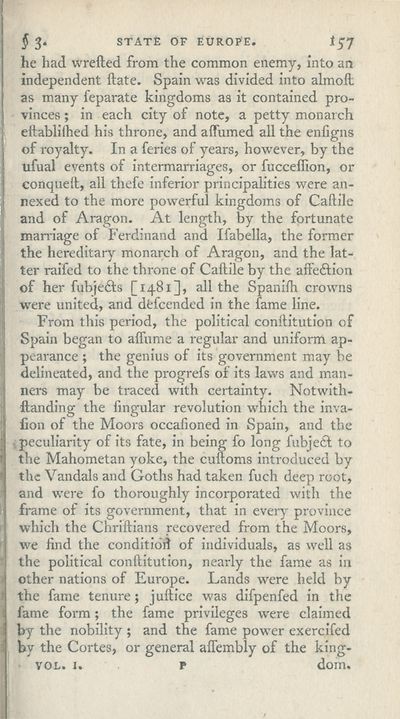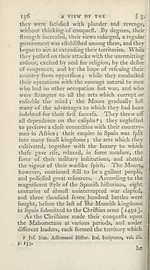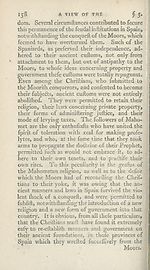Download files
Complete book:
Individual page:
Thumbnail gallery: Grid view | List view

§ 3- STATE OF EUROFE. l£7
he had wrefted from the common enemy, into an
independent ftate. Spain was divided into almoil
as many feparate kingdoms as it contained pro¬
vinces ; in each city of note, a petty monarch
eitablifhed his throne, and a (famed all the enfigns
of royalty. In a feries of years, however, by the
tifual events of intermarriages, or fucceffion, or
conquell, all thefe inferior principalities were an¬
nexed to the more powerful kingdoms of Caftile
and of Aragon. At length, by the fortunate
marriage of Ferdinand and Ifabella, the former
the hereditary monarch of Aragon, and the lat¬
ter raifed to the throne of Caftile by the affeftion
of her fubjefts [1481], all the Spanifti crowns
were united, and dfcfcended in the fame line.
From this period, the political conftitution of
Spain began to affume a regular and uniform ap¬
pearance ; the genius of its government may be
delineated, and the progrefs of its laws and man¬
ners may be traced with certainty. Notwith-
ftanding the Angular revolution which the inva-
fion of the Moors occafioned in Spain, and the
peculiarity of its fate, in being fo long fubjedl to
the Mahometan yoke, the culfoms introduced by
the Vandals and Goths had taken fuch deep root,
and were fo thoroughly incorporated with the
frame of its government, that in every province
which the Chriftians recovered from the Moors,
we find the conditiod of individuals, as well as
the political conftitution, nearly the fame as in
other nations of Europe. Lands were held by
the fame tenure ; juftice was difpenfed in the
fame form; the fame privileges were claimed
by the nobility ; and the fame power exercifed
by the Cortes, or general aflembly of the king-
vol. 1. r dom.
he had wrefted from the common enemy, into an
independent ftate. Spain was divided into almoil
as many feparate kingdoms as it contained pro¬
vinces ; in each city of note, a petty monarch
eitablifhed his throne, and a (famed all the enfigns
of royalty. In a feries of years, however, by the
tifual events of intermarriages, or fucceffion, or
conquell, all thefe inferior principalities were an¬
nexed to the more powerful kingdoms of Caftile
and of Aragon. At length, by the fortunate
marriage of Ferdinand and Ifabella, the former
the hereditary monarch of Aragon, and the lat¬
ter raifed to the throne of Caftile by the affeftion
of her fubjefts [1481], all the Spanifti crowns
were united, and dfcfcended in the fame line.
From this period, the political conftitution of
Spain began to affume a regular and uniform ap¬
pearance ; the genius of its government may be
delineated, and the progrefs of its laws and man¬
ners may be traced with certainty. Notwith-
ftanding the Angular revolution which the inva-
fion of the Moors occafioned in Spain, and the
peculiarity of its fate, in being fo long fubjedl to
the Mahometan yoke, the culfoms introduced by
the Vandals and Goths had taken fuch deep root,
and were fo thoroughly incorporated with the
frame of its government, that in every province
which the Chriftians recovered from the Moors,
we find the conditiod of individuals, as well as
the political conftitution, nearly the fame as in
other nations of Europe. Lands were held by
the fame tenure ; juftice was difpenfed in the
fame form; the fame privileges were claimed
by the nobility ; and the fame power exercifed
by the Cortes, or general aflembly of the king-
vol. 1. r dom.
Set display mode to:
![]() Universal Viewer |
Universal Viewer | ![]() Mirador |
Large image | Transcription
Mirador |
Large image | Transcription
| Antiquarian books of Scotland > Kings & rulers > History of the reign of the Emperor Charles V. > Volume 1 > (175) |
|---|
| Permanent URL | https://digital.nls.uk/109184431 |
|---|
| Description | By William Robertson. London : Cadell and Davies, 1798. |
|---|---|
| Shelfmark | ABS.1.76.13 |
| Additional NLS resources: | |
| Description | Thousands of printed books from the Antiquarian Books of Scotland collection which dates from 1641 to the 1980s. The collection consists of 14,800 books which were published in Scotland or have a Scottish connection, e.g. through the author, printer or owner. Subjects covered include sport, education, diseases, adventure, occupations, Jacobites, politics and religion. Among the 29 languages represented are English, Gaelic, Italian, French, Russian and Swedish. |
|---|

